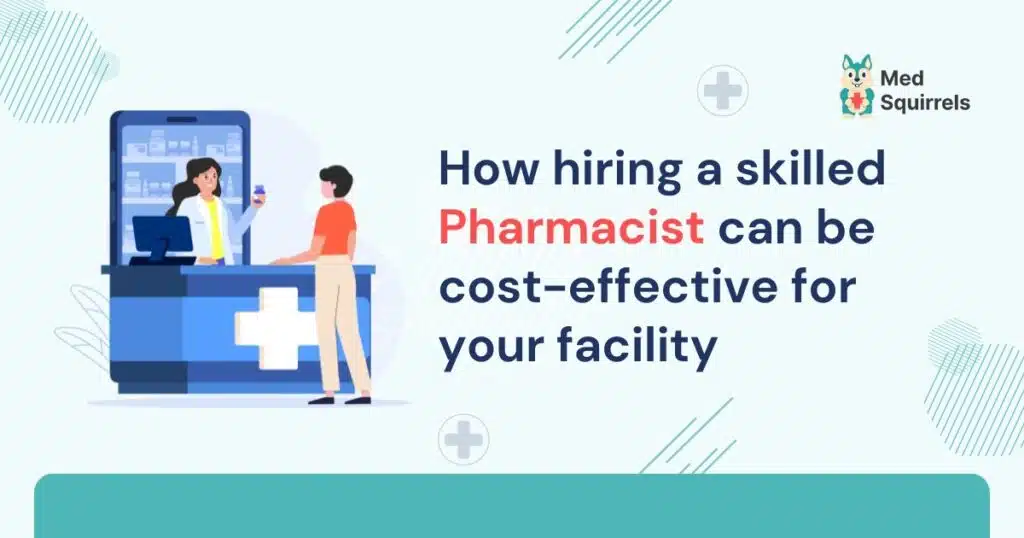How hiring a skilled Pharmacist can be cost-effective

While facilities in the USA have to ensure skilled pharmacists are staffed, the focus on proactive medication management has proved to reduce healthcare expenses. Across the US healthcare market, a large area of a facility’s costs arises from preventable adverse drug effects. Implementing the proper use of a medication review program led by skilled pharmacists can minimize almost all complications. Thus, hiring a pharmacist to handle such programs is essential.
Adverse drug effects are those fully unwanted effects of drugs that are inconvenient for both patients as well as hospitals, leading to hospital readmissions, increased length of hospital stay, and emergency intensive care scenarios. According to the American Hospitals Association, “facilities spent $115 billion in drug expenses alone during the year 2023”. At the state and local levels in the USA, there are an immense variety of reforms implemented with the main focus on better patient care, inexpensive availability of drugs, treatment strategies, etc. Hiring pharmacists has to be done thoroughly as they proactively save facility costs by handling medication-related matters before they become grave health issues that demand extended days in the hospital or additional interventions. Thus, contracting a pharmacist ensures that these critical operations are managed justifiably and benefit the health sector in general.
How to hire a pharmacist by partnering with a staffing platform?
If you are worried about the process of how to hire a pharmacist, then partnering with a credible staffing platform like MedSquirrels makes the process of hiring a pharmacist smooth and efficient. Define the qualifications, experience, and skills required for the position; remember that pharmacy cost-saving initiatives are ideal experiences. The staffing platform will identify and interview candidates to ensure hiring the right pharmacist who would help improve your pharmacy operations. This agency identifies the best talents available in the market, which are well aligned with your goals, and they provide a smooth hiring process and the best possible results for your business. Furthermore, you may be able to resolve staffing challenges much faster through continuous support from the agency. This type of partnership to hire a pharmacist will ensure that excellent patient care is delivered while keeping the operation running efficiently. With the right pharmacist, your facility can, within the right frameworks, initiate effective cost-cutting measures along with overall improvement in service delivery.
What does a pharmacist do?
The primary responsibilities of a pharmacist involve administering prescribed medicines and addressing the patient’s queries regarding the drugs. They also collaborate with other healthcare professionals to deliver optimized treatments to patients. Customized drugs are prepared by pharmacists in cases when there is an unavailability of drugs or when the available drug is of high dosage.
With modern healthcare systems and stringent norms, pharmacists play a major role in preventing adverse drug effects and following drug safety protocols. They also team with insurance providers to settle billing-related issues. In short, pharmacists act as a bridge between patients, doctors, insurance payers, and suppliers, and hiring a pharmacist can help your facility save money, which we will learn more about later in this blog.
The role of Pharmacists in different settings
A pharmacist performs a series of tasks depending on the role and the work setting. While hiring a pharmacist, always make sure that you pick according to your facility’s specific needs. Some examples of the different roles of pharmacists include:
- Community pharmacists: Community pharmacists are the traditional pharmacists who work in drug stores to dispense medicines.
- Clinical pharmacists: These pharmacists work in hospital settings, and their duties include monitoring the drugs administered to patients, in-patient medication review, and pharmacotherapy interventions.
- Ambulatory care pharmacists: They work in outpatient clinics, and their job description might include patient assessment.
- Consultant pharmacists: These pharmacists work independently or associate with facilities to review medical regimes, provide strategies for drug optimization, etc.
- Specialized pharmacists: Some pharmacists specialize in areas such as long-term care for the elderly, pediatrics, oncology, etc., and provide service in such settings.
How does hiring pharmacists help save money for facilities?
Advancing drug shortages along with the rising prices of drugs is one of the major setbacks faced by the healthcare systems today. According to the National Institute of Health study, over the last seven years, inpatient prescription drug spending has increased by around 15% to 20%. The rapidly changing drug prices are significantly impacting hospital funding and operations. The following are some ways in which hiring the right pharmacist can save you money. Hire a pharmacist to ensure optimal medication management, reduce waste, negotiate better drug prices, and implement cost-saving initiatives effectively.
- Avoid medication errors and adverse drug events, which can increase the length of hospital stay.
- Limit pharmacy waste by downsizing unused or expired medications.
- Dose optimization and therapeutic intervention of patients’ medication.
- Negotiate with pharmaceutical suppliers for cost savings while maintaining the quality of the drugs.
- Educate patients on medication adherence, potential side effects, and preventative care to reduce in-patient admissions.
- Ensure compliance with regulations related to medication storage, handling, dispensing, and documentation, so that penalties can be avoided.
Cost-effective strategies implemented through pharmacy
- 340B drug pricing program: This program was designed to see if medicines are affordable even to underserved populations in the USA. Facilities that serve low-income and vulnerable populations get discounts on all the eligible outpatient drugs from manufacturers under this program. Here, you have to hire a pharmacist who can work within the framework of the federal 340B drug pricing program. They manage the drug procurement from suppliers at discounted prices and make sure it is beneficial to the patients at no additional cost. The hospitals also benefit from this cost-saving initiative for pharmacies.
- Value-based purchasing initiatives: These initiatives represent a shift from traditional fee-for-service models towards payment models that reward facilities based on outcomes and the overall value of care delivered. Pharmacists play a major role in continued value-based care for patients.
- For example, facilities under the Medicare Part D plans are evaluated and rated based on various quality measures, and facilities with higher star ratings may receive bonus payments from Medicare. This incentive system promotes better patient care outcomes. Medication Therapy Management (MTM) and other strategic interventions by Pharmacists help hospitals get better ratings.
- Antimicrobial stewardship program: The role of an antimicrobial or infectious disease pharmacist is to set appropriate guidelines for using antimicrobial drugs and administer them to enhance patient health. This decreases the incidence of adverse drug reactions, leads to shorter hospital stays and fewer complications from infections, and eventually helps facilities cut down their operational expenses. Cost-saving initiatives for pharmacists are crucial in this process.
- Transition of care programs: The transition of care pharmacists help patients in the transitioning stages of care, from healthcare settings to home or between different levels of care within the hospitals, by providing care coordination, reconciliation of medications, and follow-up monitoring. The process visibly reduces the chances that high-risk patients will be readmitted to the hospital, reducing healthcare costs. A study published in the Journal of Managed Care and Specialty Pharmacy reveals that these TOC programs reduce the readmission rate by 32% within six months and save $2,139 per patient for the facility. Cost-saving initiatives for pharmacists in these programs are quite essential for financial efficiency.
- Advanced practice pharmacists: With the low availability of physicians in most rural healthcare settings, an advanced practice pharmacist can be relied upon to provide primary care to the patients. To hire advanced practice pharmacists in your facility, you must ensure that the state in which the facility is located allows for collaborative practice agreements (CPA). CPAs formalize partnerships between pharmacists and healthcare providers, enabling advanced practice providers (APPs) to extend their patient services, especially for chronic conditions. The scope of work might vary based on state norms, but it would include limited physical assessments, lab test orders, and medication prescriptions. These cost-saving initiatives for pharmacies at work can also help the healthcare organization save money.
Due to all the above reasons, there is always a huge demand for skilled pharmacists. Various factors such as their knowledge in the domain, specializations, familiarity with the government norms, ability to negotiate with the drug supplier, and patient interaction skills should be screened when hiring a pharmacist for your facility. Finding the right talent with the appropriate experience in the domain is a time-consuming task.
Fret not! MedSquirrels is an all-in-one SaaS platform that will help you overcome this challenge and enable you to hire a pharmacist quickly and cost-effectively! After you sign up for our platform, you just need to mention your exact job specifications for the open role. In 2-5 business days, our platform will provide you with the best curated profiles of pharmacists who match your job requirements. To use our AI-enabled platform, you only need to pay a flat license fee and the monthly payroll cost per hire. We provide three hiring plans that will meet your needs to hire pharmacists: Orange and Purple Plan for contract staffing and the Blue plan for permanent staffing. Check our three distinct hiring plans in detail and their pricing here. Get started today!
FAQs
How to hire a pharmacist with proper skills to avoid medication errors?
Hiring a pharmacist with skills may be able to identify possible errors and interactions, ensuring safe and proper patient care. This results in fewer incidents of error that could be due to corrective treatment and readmission into the hospital.
What are some cost-saving initiatives for pharmacies that an efficient pharmacist can initiate?
A good pharmacist can initiate cost-saving initiatives for pharmacies such as optimizing the acquisition of drugs, managing the stores with proper check of supplies, and taking services from the 340B drug pricing program to get discounted drugs. All these measures make a great deal of savings financially.
How would hiring a pharmacist improve patient outcomes?
Hiring a pharmacist with experience in pharmacy medication management would ensure that the patients receive appropriate and most effective treatments to manage their diseases. This will lead to a better health outcome in terms of a reduction in costly emergency interventions and extensive hospital stays.
How will partnering with a staffing platform make the hiring process of a pharmacist more efficient?
Partnering with a staffing platform makes the process about how to hire a pharmacist more efficient because it grants access to a pool of pre-vetted candidates. The platform handles recruitment, interviews, and background checks, ensuring you hire a pharmacist who is the best fit for your facility.
What is the role of a pharmacist in cost-saving initiatives for pharmacies, such as value-based purchasing and antimicrobial stewardship?
A professional pharmacist plays an important role in cost-saving programs by making medication use aligned with criteria set up by value-based purchasing and guidelines established by antimicrobial stewardship. Such programs automatically enhance the quality of patient care and avoid unnecessary healthcare spending.
Jani Basha is a healthcare content expert at MedSquirrels, sharing insights on staffing trends, hiring best practices, and career growth.
